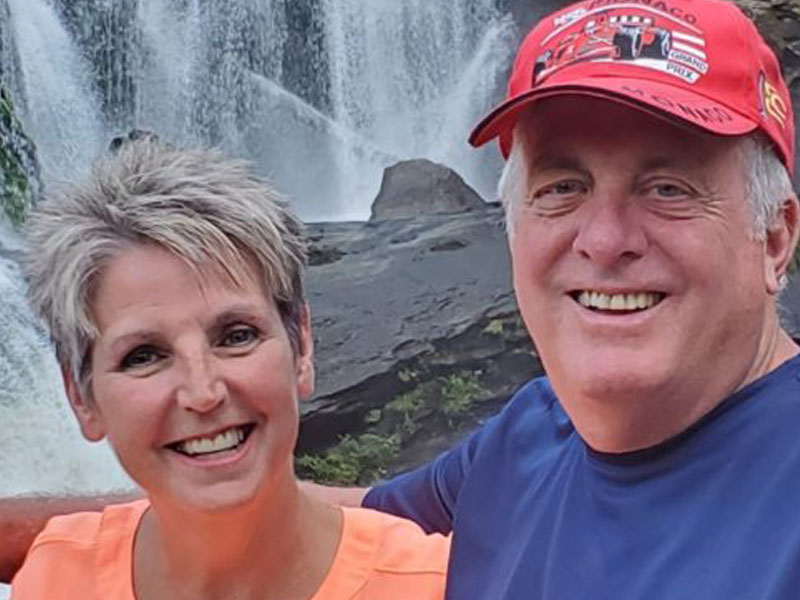3D design customizes joint replacement for Parkwest patient

Back to work and helping his wife, Esther, with their home business, Minton says he only regrets that he waited so long before getting his new shoulder.
For some people, retirement means rest and relaxation or getting away from it all. For Blair Minton, 68, you might say retirement has gone to the dogs.
“My wife and I breed, sell and train toy and miniature Australian shepherds,” Minton says. “Currently we have 20 adults and 16 puppies.”
Minton also manages assisted living facilities in Illinois, where he and his wife used to live. The Mintons moved to East Tennessee almost two years ago and have loved living among the friendly people of faith in their community. Minton has multiple reasons to feel good about retiring in Tennessee, and one of them is his new shoulder after surgery at Parkwest Medical Center.
A Shoulder Slow-Down
Active and athletic, Minton played basketball, volleyball and golf on a regular basis until the age of 60, and enjoyed scuba diving, too. He had to start slowing down when joint pain began to creep in.
“I had been having problems with my shoulder for four or five years and it got progressively worse,” Minton says. “There was no injury, it was just hurting all the time and the hurting got worse.”
Eventually Minton also lost range of motion in his shoulder and could only lift his arm to about a 90-degree angle. “I couldn’t lift it above that and I couldn’t carry any weight with it,” he says. “I probably let it go way too long, but I didn’t really want surgery.”
When Minton finally did decide to consider joint replacement, he knew he wanted a surgeon who specialized in shoulders. After a lot of research and recommendations, Minton discovered Justin Kennon, MD, a surgeon at Parkwest Medical Center.
From the first appointment, Minton felt good about trusting Dr. Kennon with the surgery. “He was not in a hurry,” Minton says. “He gave me all the time I wanted. My wife was with me; we asked probably 50 questions and he was very patient and answered every one.”
Astronauts, Automotives and a Surgical Solution
When Minton decided to go forward with surgery in December 2019, he didn’t just get a new shoulder. It was a custom designed shoulder.
At Parkwest Dr. Kennon uses fascinating modern technology, tapping into science that also is applied in areas like space travel and automotive innovation. He uses it to create a picture-perfect design for joint replacement.
“I am able to obtain a quick CT scan of a patient’s shoulder at the hospital, and the scan is then turned into a 3D model for each patient,” says Dr. Kennon. “I plan a customized shoulder replacement for each patient on the computer software before surgery.” Similar to technology used in spacecraft or automotive design, this plan is then turned into a 3D printed model of the patient’s shoulder.
Dr. Kennon uses the custom shoulder plan during surgery to place the best implant in the best position for each individual patient. There was a time when shoulder replacement was a onesize-fits-all situation, but no more.
“Simply put, I think my patients deserve the best,” Dr. Kennon says. “Nothing is more satisfying than helping patients get back to enjoying their lives free of shoulder pain.”
Even though it was major surgery and Minton knew it would take time to recover, he could tell a difference before he left the hospital. The joint pain that had held him back for so long was gone immediately.
After prescribed physical therapy, Minton and his new shoulder are back to life. “I have full range of motion in my shoulder, I can lift; I can do whatever I want,” Minton says. “There’s no pain. I wish I’d done it a lot sooner.”
Getting Ready for Joint Replacement
If you’re considering surgery for a new shoulder, hip or knee, there are several things you can do ahead of time for a better outcome. Here are some steps recommended by The Joint Replacement Center at Parkwest Medical Center:
Find the right surgeon. As is the case with any surgery, there are some risks associated with joint replacement. It’s important to make sure the surgeon is experienced and is working at a hospital that has a great track record. For example, Parkwest has been recognized nationally for outcomes in several joint replacement specialties.
Check your meds. If you’re currently taking any medications, make sure your surgeon knows ahead of time. Some medications may need to be temporarily discontinued until after the surgery.
Plan ahead. Work with the members of your surgeon’s team to prepare a plan for your discharge. They can offer helpful information about medication for pain, how to care for your incision, special exercises, how to return to an active lifestyle and other instructions. Parkwest offers comprehensive education in these areas prior to any type of joint replacement surgery.
Get ready for rehab. It’s important to find the right rehabilitative program to restore function, mobility and strength. Parkwest offers a comprehensive physical therapy program in West Knoxville for joint replacement patients.
The Joint Replacement Center at Parkwest Medical Center is a regional leader in joint replacements for pain relief, mobility and activity. The Center helps patients partner with their medical care team to get ready for the procedure and the recovery period afterward.
Is It Time for a New Shoulder?
Joint replacement surgery is safer and more effective than ever before. It often allows patients to go back to daily activities that pain and limited range of motion had forced them to give up.
To decide if it’s time for a new shoulder, surgeons usually review the results of X-rays or an MRI looking for signs of joint damage. The surgeon will also consider how much a patient suffers pain that prevents normal, daily activities and interrupts sleep.
A good surgeon won’t rush you into total joint replacement, and may recommend that you try other treatment options first. The list of options usually includes pain medication, losing weight to ease stress on joints, exercises or physical therapy and cutting back on activities that make the pain worse.
There are many aspects to consider related to any surgery, including joint replacement. For example, the younger you are when you get a new shoulder, the more likely you are to need surgery to revise the joint replacement in the future. Surgery to fix or replace artificial joints has a higher risk of infection and other complications.
When a shoulder joint doesn’t work the way it should, it can be extremely painful and very frustrating. When other treatments don’t help, it might be time to find out if you’re a candidate for shoulder replacement.
Ultimately, it’s a quality of life decision. To find out if joint replacement surgery is right for you, see your doctor and visit tocdocs.com.




